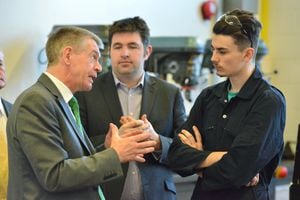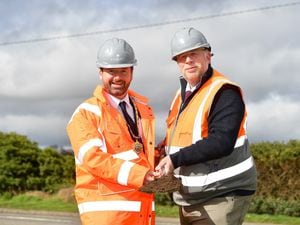Telford skills call from Unite contender
A leadership contender for Britain's biggest trade union has called for more investment in skills for young people to help address shortages that could emerge from Brexit.

Gerard Coyne said Britain's decision to leave the EU could leave manufacturers and engineers without access to "off-the-shelf" skills, in the form of trained workers from the continent.
Speaking on a visit to the Discovery Centre, which provides training for engineers at Telford College of Arts and Technology, he said that meant more young people in Britain need to be given training now to meet future shortfalls.
"There's been no hiding the fact that Teresa May said it's heading towards a hard Brexit, and border control will be reinstated," he said.
"Many employers with difficulties around skills would look to recruit from other parts of Europe to fill these gaps and sometimes the working arrangements and even facilities like this weren't available to coordinate their engagement with skills.
"It's very clear that's going to change. The government are talking about access for certain higher level skills but engineering activity I've witnessed here today is at the heart of ensuring we are equipping our economy to face the challenges of Brexit."
The Midlands regional secretary, who is standing against Len McCluskey to become the new general secretary of the 1.3 million-member union, said he was left unimpressed by Chancellor Philip Hammond's budget on Wednesday.
"The national insurance increase on self-employed people doesn't deal with the issues," he added.
"Many people, particularly in construction but increasingly in other areas, are effectively employed in their working relationship but are forced to take on self-employed status.
"If you tax those that are in their own business then you have to look at what benefits are provided as well. You need to look at paternity and maternity rights, and other state benefits that come with employed status."
Regarding Brexit, he added: "I listened to Unite members after the referendum and for many the key issue was immigration, and that influenced the way they voted.
"If you're addressing the concerns and have border controls, then you're not going to retain access to the single market, and we have to face that reality now and get on with the job.
"That means getting employers to commit to the UK for 10 or 20 years, getting them to invest in skills now.
"It also means we should be talking to them about good employment practices that came out of Europe. We should be looking at opportunities like stronger procurement policies and supporting UK manufacturers, and if after two years we achieve a soft Brexit then good, we have spent two years getting more competitive.
"There are key sectors like automotive where there has to be a real focus on making sure tariffs are addressed early in the negotiations because the uncertainty can't be allowed to just rumble on."





